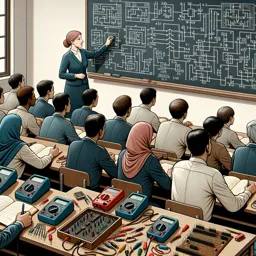What is an Electrical Circuit?
An electrical circuit is a closed loop that allows current to flow from a power source through various components—such as wires, resistors, switches, and loads—before returning to the source. Understanding circuits is fundamental for anyone training to be an electrician, as these systems form the backbone of residential, commercial, and industrial electrical installations.
Types of Electrical Circuits
- Series Circuits: Components are arranged in a single path. If any part fails, the entire circuit stops functioning.
- Parallel Circuits: Components are connected across common points, creating multiple paths for current flow. Electrical outlets in homes are typical examples.
Key Circuit Elements
- Power Source: Provides the electrical energy (batteries, generators, main supply).
- Conductors: Wires or traces that carry current.
- Load: Devices that consume the energy (light bulbs, appliances).
- Switch: Controls current flow by opening (off) or closing (on) the circuit.
Basic Laws and Principles
Electricians must understand fundamental principles such as Ohm’s Law—which relates voltage (V), current (I), and resistance (R)—and Kirchhoff’s Laws that govern complex circuit analysis. These concepts help in troubleshooting and designing safe, effective wiring systems.
Practical Applications for Electricians
- Wiring a Light Fixture: Apply knowledge of series and parallel circuits to safely install and control lighting.
- Outlets and Switches: Learn to diagnose and fix common issues such as tripped breakers or faulty connections.
- System Troubleshooting: Use circuit diagrams and testing tools (multimeters) to locate faults and ensure compliance with electrical codes.
Why Understanding Circuits Matters
Mastery of electrical circuits is essential for a career as an electrician. It not only ensures safety and reliability but also opens up opportunities for advancement into specialized areas such as industrial automation, building management systems, and renewable energy installations.
Further Learning
If you’re considering a professional course in electrical engineering, start by strengthening your knowledge of circuit concepts. Hands-on practice, safety awareness, and continual study will set the foundation for a successful and rewarding path as an electrician.































